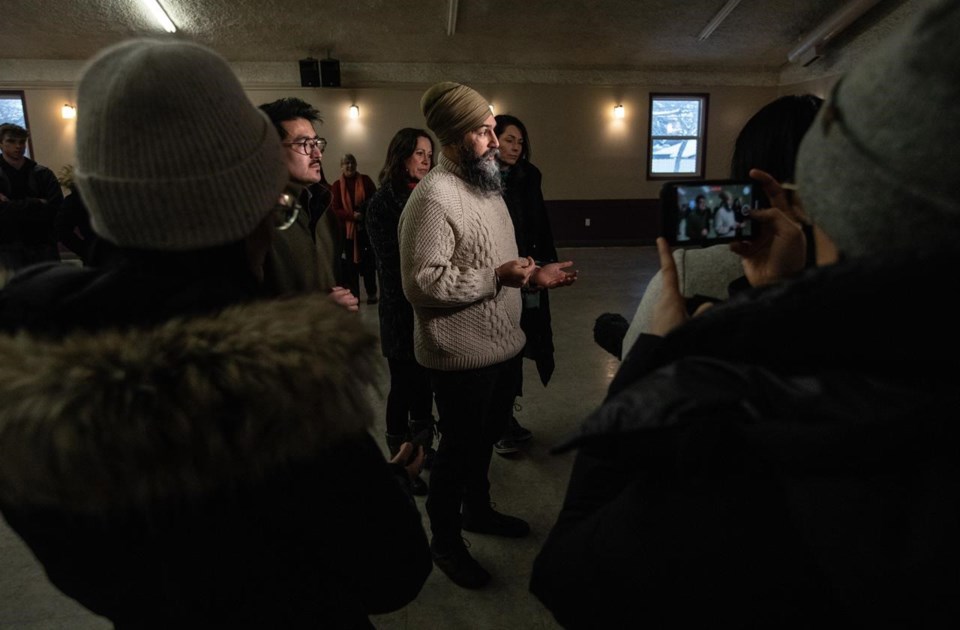EDMONTON — Federal New Democrats spent Wednesday seeking guidance from Albertans, who the party said are on the front lines of Canada's housing crisis, to help them form policies around addressing the needs of lower-income households.
NDP members of Parliament met with local housing experts in Edmonton seeking solutions for how Ottawa can respond. The city declared a state of emergency earlier this month amid a higher rate of homelessness following the COVID-19 pandemic.
"It reinforced something that we've really believed for a long time, that when it comes to where we're at with housing, we didn't get here by chance," NDP Leader Jagmeet Singh said to The Canadian Press on Wednesday.
"This is decades of neglect."
He said Liberal and Conservative housing policies favour private development to fix Canada's housing shortage. But he said the government also needs to find ways to invest in non-profit housing, purpose-built rentals, co-operative housing and student housing.
"We basically need every type of housing you can think of because everybody needs a home, whether you're a 20-year-old or a 40-year-old, born here or came here," Singh said.
The free market cannot be trusted to solve the country's affordability crisis and more solutions are needed, said Gord Johns, the NDP's mental health critic.
"The free market has never solved affordability issues," Johns said to a roundtable of housing experts in Edmonton on Wednesday.
The party is also looking to leverage the influence it has in its confidence-and-supply agreement with the minority Liberal government to push through more housing measures in the next federal budget, with discussions already starting between the NDP and Finance Minister Chrystia Freeland.
The next big thing the party is pushing for is a national acquisition fund, to help municipalities or non-profits buy buildings that are being sold off, and keep it as affordable housing or co-operative housing.
The New Democrats have a history of making budget deals with minority Liberal governments when it comes to housing.
In 2005, former NDP leader Jack Layton struck a deal with former prime minister Paul Martin that saw $1.6 billion go into affordable housing, including homes for First Nations.
And when the Liberals and NDP negotiated their confidence-and-supply agreement two years ago, they allocated billions to help build 100,000 homes across Canada, including affordable homes.
But Conservatives, who have surged past their political rivals in the polls over the past six months, continue to place what they say is Canada's "housing hell" directly on the shoulders of the Liberals and NDP. Conservative Leader Pierre Poilievre has said he would deal with the housing crisis by rewarding municipalities that build homes while "punishing" those that stand in the way of development.
While housing was a major topic for the NDP caucus members who gathered in Edmonton for their three-day retreat, they also discussed health care and toured the local training centre for the International Brotherhood of Electrical Workers union, and a nursing and dentistry school. A roundtable was also held with First Nation leaders and businesses.
But the U.S. election was also top of mind for the party after Donald Trump won Tuesday's New Hampshire primary, tightening his grip on the Republican nomination.
Singh said the former U.S. president is an "egomaniac" who lives in his his own world, and that his bid to win back the White House could spell trouble for Canada.
The federal Liberal government plans to launch a "Team Canada" task force to promote its domestic interests to prepare for a Trump presidency, which Prime Minister Justin Trudeau has warned would come with a sizable degree of unpredictability.
And with Trudeau's party down in the polls, Liberal MPs have tried to paint their Conservative rivals with the same brush, denouncing Poilievre as representing "Trump North."
The Conservatives have dismissed the attacks as Liberal efforts to distract Canadians from the pocketbook issues they predict will be Trudeau's downfall.
Singh, too, has tried to link Poilievre and Trump, accusing both of being in politics for themselves.
"What we often see him do is pick on the weak. He's not willing to take on corporate greed, he's not willing to take on the powerful because that's who he's controlled by," Singh said.
Conservative spokesman Sebastian Skamski accused Singh of covering for the Liberals to distract from Trudeau's "record of misery" after eight years in power.
The "costly coalition" between the Liberals and the NDP "is desperate to blame their failures on anyone but themselves," Skamski said in a statement.
Singh, whose party hopes to wrest seats in Alberta away from the Conservatives in the next federal election, frequently reminds his audiences about the last time the Tories and former prime minister Stephen Harper were in power.
It's all part of a familiar NDP gambit: trying to position the party as a viable, trustworthy alternative to the predictable pattern of Liberal and Conservative governments.
He urged people to look to his party's track record of helping to usher in new social policy initiatives, such as a public dental care plan for uninsured Canadians, rather than dwelling on comparisons to the former president.
The caucus retreat ends on Thursday, with Singh expected to make closing remarks outlining his party's stance on issues such as housing, health care and affordability before MPs head back to Ottawa for Parliament's return next week.
This report by The Canadian Press was first published Jan. 24, 2024.
Mickey Djuric, The Canadian Press

